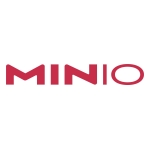MinIO Announces General Availability of MinIO Object Storage on the VMware vSAN Data Persistence Platform with the Release of VMware Cloud Foundation 4.2

High-Performance, Kubernetes-Native Object Storage Can Now Be Provisioned Directly from VMware vCenter
PALO ALTO, Calif.–(BUSINESS WIRE)–MinIO, a pioneer in high performance, Kubernetes-native object storage, today announced the general availability of MinIO object storage on the VMware vSAN Persistent Data platform through the version 4.2 release of VMware Cloud Foundation. This release marks an important milestone for enterprises seeking to adopt Kubernetes-native, performant object storage as part of their hybrid cloud strategies.
The joint solution enables access to the underlying storage through vSAN Direct Configuration, a technology that provides select stateful services with direct access to the underlying disks. Using this access path, MinIO can employ its highly optimized in-line erasure coding, bitrot protection, object locking and other enterprise features to deliver performant, resilient and scalable infrastructure to IT administrators through the VMware vCenter interface. Leveraging a simplified data path, the joint solution allows MinIO to run at speeds approaching their industry-leading benchmarks. Because MinIO operates at the supervisor cluster level of VMware vSphere with VMware Tanzu, the solution allows enterprises to create extremely large-scale object storage clusters with only a few clicks.
MinIO object storage provides VMware customers with access to MinIO’s expansive list of integrations with cloud-native applications. MinIO, in turn, benefits from access to VMware’s enterprise IT ecosystem and the deep operational experience garnered from hundreds of thousands of vSphere customers.
“Customers are looking to run and manage modern and traditional apps with consistent operations across clouds,” said Lee Caswell, vice president of marketing, cloud platforms business unit, VMware. “We are pleased to enable high-performance, Kubernetes-native object storage from MinIO on VMware Cloud Foundation with Tanzu, the ubiquitous hybrid cloud platform. MinIO’s Kubernetes expertise made them a natural partner and was invaluable as VMware sought to build our vSAN Data Persistence platform. Their popularity in the open-source community, coupled with their native offering with a rich portfolio of cloud-native applications make them a superb choice for our enterprise IT customers.”
The general availability of this joint solution supports VMware’s goal of letting enterprises build, run, manage, connect, and protect any app on any cloud and across clouds. Those goals require consistency with regard to the infrastructure, operations and developer experiences. In addition to vSAN, MinIO abstracts the differences inherent in both public cloud object storage and private cloud protocols such as HDFS, NFS, SMB, and iSCSI. MinIO can be deployed on any cloud infrastructure, converting them into an AWS S3-compatible object storage service while simultaneously providing seamless interoperability to existing storage systems, making them a leader in the hybrid cloud.
Applications that utilize MinIO object storage are able to access data on their existing infrastructure without migrating the data over. As a result, both cloud-native applications and traditional enterprise applications can co-exist, creating a roadmap for the eventual migration to 100% cloud native.
“The general availability of vSAN Data Persistence platform through this VMware Cloud Foundation release marks a key milestone in enterprise Kubernetes adoption,” said AB Periasamy, co-founder and CEO of MinIO. “Through this design partnership, MinIO can deliver high-performance object storage to VMware’s extensive customer base, enabling a broad range of use cases that require both scale and performance.”
Core use cases supported by MinIO with the Data Persistence platform include:
Backup/Snapshots/Archival – MinIO brings best-in-class performance and S3 compatibility to these tasks, ensuring both backup and restore are accurate and fast—even for small objects (<1MB in size).
AI and ML – This class of use cases requires performance at scale—a capability that MinIO is uniquely positioned to offer. Using Kubernetes, Kubeflow and MinIO, enterprises can deploy complex multi-stage data processing and machine learning pipelines. In these examples, MinIO is the datastore for ML and AI data pipelines where training, inference reads/writes occur. Examples include TensorFlow, PyTorch, H2o.ai, Spark, Presto and Flink.
Web/Mobile Cloud Native Application Development – As the storage class of the cloud, object storage is the default storage type for the tens of thousands of internally developed applications (consumer and enterprise) where performance and scale are important. By offering a RESTful API, MinIO is designed for containerization and orchestration—just like the cloud-native applications it supports.
Analytics – Modern analytics platforms use S3 endpoints as their default for both primary and secondary storage. Analytics demand performance at scale, as many of these instances are 50 PB or more in size and carry the expectation of a “warm” tier at a minimum and “hot” tier in performance-oriented environments.
Artifact Stores – The cloud-native world depends on scalable object storage for keeping artifacts. These instances can grow quickly and require high throughput, making them excellent for MinIO.
MinIO’s software release for the vSAN Data Persistence platform is available through the vCenter interface. Customers can trial the software for 60 days through a license key. All trial customers will be onboarded to the MinIO Subscription Network where they will receive support, diagnostics and can manage their licensing going forward.
Detailed information on MinIO’s VMware integrations can be found at https://min.io/solutions/vmware.
About MinIO
MinIO, the company behind the open-source object storage suite, is pioneering high performance object storage. Their software-defined, Amazon S3-compatible object storage system is optimized for the hybrid cloud. MinIO was voted the “Most Impactful Open Source Project” by Strata/O’Reilly in 2019 and is run by more than half of the Fortune 500.
Founded in late 2014, MinIO is backed by Nexus, General Catalyst, Dell Technologies Capital, Intel Capital, AME Cloud Ventures and key angel investors. As of August 2020, it had more than 400M Docker pulls making it the fastest-growing private cloud object storage company.
VMware, VMware vSAN, VMware Cloud Foundation, vSphere, Tanzu, and vCenter are registered trademarks or trademarks of VMware, Inc. or its subsidiaries in the United States and other jurisdictions.
Contacts
Jonathan Symonds
MinIO
hello@min.io
408-656-8022
Eleni Laughlin for MinIO
e@eleni.press
510-406-0798
